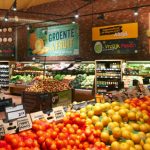The costs of diet and proper nutrition
According to an article published in Great Britain , being on a diet costs us a lot of money : between diet foods, food programs and gym memberships where after the first time we no longer set foot, or the expense of various tools and supplements, we spend the equivalent to buying a studio apartment. A British woman spends a good one hundred thousand pounds in her entire life to lose weight : that would be one hundred and twenty-four thousand euros with us. Yes, in short, you buy the studio apartment. Or you can redo it all at least six times. Or go around the world. Instead you wasted time dieting and buying things with unpronounceable names.
 But let’s go into detail: how can we lose weight and have a proper diet without spending a fortune? That’s a good question. Aivoglia to say fruit and vegetables, meat and fish: now everything costs a lot. And guess what it costs very little? Junk food. Snacks, biscuits, sugar, refined flour, white rice, foods preserved in various ways
But let’s go into detail: how can we lose weight and have a proper diet without spending a fortune? That’s a good question. Aivoglia to say fruit and vegetables, meat and fish: now everything costs a lot. And guess what it costs very little? Junk food. Snacks, biscuits, sugar, refined flour, white rice, foods preserved in various ways
But then what can we do to go on a diet without donating blood to the supermarket cashier, also because she doesn’t know what to do with it, besides we get everything dirty? I have compared various articles on the subject and have come to draw up some general rules.
1) Learn to cook: if you don’t know how to cook or clean vegetables you are already at a disadvantage. By focusing on seasonality, of course. Leafy vegetables are the ones that cost the least of all. Of course, you have to wash well, and the temptation to buy leaf bags is great, but for everything already prepared there is a surcharge. In addition to this I have seen that onions, fennel and cucumbers always have low prices and are excellent in a weight loss diet.
2) Make a list (also assuming the prices): you need a list if you want to save. 3) Buy cereals and legumes: legumes are cheap, and in a correct diet they should be eaten even three or four times a week, certainly they are not bad. They are also good in cans. Whole grains may cost more, but they pay a lot, such as barley. 4) Take advantage of the freezer and keep an eye on offers: you can buy meat when it is on offer in greater quantities and then freeze it, but also vegetables. Clean them all at once, cut and pack them, and in a few hours, you can hurry up for a week .
6) Buy discounted products because they are close to expiration: you can safely cook or freeze them. Overripe (brownish) bananas can be used to cook cakes and cookies with fewer eggs and less sugar, for example.
7) Make a plan of what you will cook weekly , it is essential to understand what and how much to buy.





























+ There are no comments
Add yours